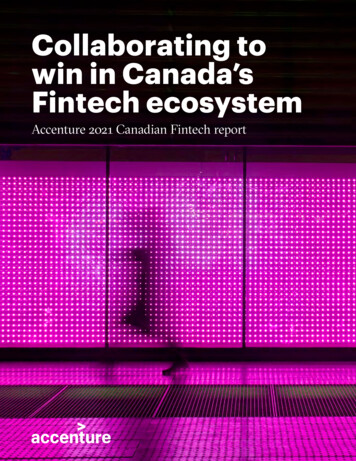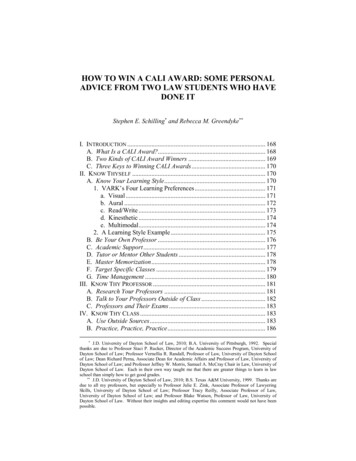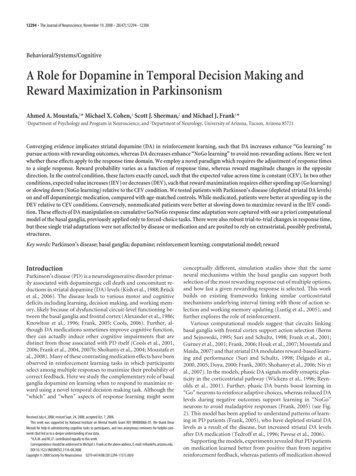
Transcription
Collaborating towin in Canada’sFintech ecosystemAccenture 2021 Canadian Fintech report
ContentsIntroductionExecutive SummaryPart 1: Canadian Fintech Ecosystem AnalysisPart 2: Financial Services Industry Outlook and TrendsPart 3: Global Fintech Ecosystem BenchmarkingPart 4: The Canadian Fintech Ecosystem: Looking AheadAppendix A: Global Fintech Ecosystem Benchmarking MethodologyAppendix B: Definition of Funding TypesReferences2345344654586162
IntroductionAs the pace of change continues to accelerate, industry boundaries blur;financial institutions, now more than ever, are adopting the mindset oftechnology companies. As both market and regulatory forces push theseCanadian companies into the spotlight, the financial services ecosystem maybe poised to deliver the most personalized and seamless digital experiencesCanadians have ever seen. This report offers insights into this ecosystem for2020 in four parts:Part 1: Canadian Fintech Ecosystem AnalysisWe examine the current state of the Canadianfintech ecosystem - at both the national andcity level - in terms of growth, talent, andinvestment. We also discuss how incumbentfinancial institutions (FI) are responding andcollaborating, the importance of incubatorsand accelerators, and the government’s role insupporting even further innovation.Part 2: Financial Services Industry Outlookand TrendsWe elaborate on key emerging trends wesee as influencing the future direction of theCanadian financial services industry. Theseinclude data ownership, privacy and digitalidentity, the banking-as-a-service model,the importance of small and medium-sizedbusiness (SMB) clients, and several possibleindustry impacts from COVID-19.Part 3: Global Fintech EcosystemBenchmarkingUsing our benchmarking model, we rankfour Canadian cities (Calgary, Montreal,Toronto and Vancouver) against 16 leadingand emerging fintech hubs around theworld. This quantitative model draws on 46individual data points from various publicand proprietary sources, distilled into five keymetrics.Part 4: The Canadian Fintech Ecosystem:Looking AheadFinally, we summarize our findings and exploreopportunities to further accelerate the growthof the Canadian fintech ecosystem. Keythemes moving forward will be acceleratingecosystem collaboration, fostering innovationpolicy and expanding global recognition.3
Executive SummaryThe Canadian fintech industry approachedthe end of 2019 on a bull run, entering a newdecade with hundreds of nascent startupssupported by record levels of investment.Some of this success has been temporarilyovershadowed by COVID-19. Now cautiouslynavigating out of quarantine, we look back atan unprecedented year for Canadian fintechwhile examining trends that may shape thefuture of the ecosystem.Strong ecosystem partnerships coupled withsophisticated investors have helped Canadianfintech startups during the crisis. Incumbentsand startups alike have also found innovativeways to use their platforms to assist clientsand the public at large during the pandemic.Venture capitalists also remain optimisticabout future industry prospects, particularlygiven the country’s strong talent base andcross-border appeal.The changing dynamics between fintechsand other ecosystem participants - includingincumbents, innovation hubs and thegovernment - are also of interest this year.As more institutions develop technologypartnerships, new strategies are emergingfor both serving and protecting customers.Concerns about the privacy and security ofconsumers have been raised in recent publicconsultations particularly when it comes torising usage of screen scraping technology.While the pandemic has accelerated the4adoption of digital among Canadians, thelong-term impact of COVID-19 on the pace,shape and evolution of the fintech ecosystemremains to be seen.As policy catches up to consumer behaviour,Canada is already witnessing the emergenceof modern enablers built for a connectedfuture. Several public and private bodiesare pushing ahead with digital identityprojects, while banking-as-a-service modelsare blurring the lines of what it means to bea “fintech”. The pandemic also bared otheropportunities and gaps in the market. Forone, fintechs demonstrated their resiliencein a socially distant economy. The industry atlarge may also help set new standards in ourpost-pandemic world in areas such as creditdecisioning and small business solutions.Cloud, AI and API technologies also stand tooffer evermore personalized and seamlessexperiences.Looking ahead, the Canadian ecosystemremains poised for growth. Our globalbenchmarking study found that whileCanadian cities are benefitting from the basicfactors necessary to achieve internationalleadership, major hubs may still have roomto build stronger reputations as world-classfintech communities. Hubs such as Calgary,Montreal, Toronto and Vancouver mightachieve this by fostering further innovation,collaboration and international expansion.
Part 1:Canadian FintechEcosystem Analysis5
I. Canadian Fintech OverviewDespite the challenges brought about by the global pandemic, 2020 remainedan exciting year for Canadian fintech*. As the ecosystem evolves, newpartnerships are being forged and international recognition is on the rise.Although long-term trends shaped by COVID-19 remain to be seen, manyCanadian fintechs and financial institutions stepped up and pitched in fromcoast-to-coast, despite the uncertainty. Looking ahead, we remain optimisticabout the country’s tech talent as well as the prospects for Canada’s growingfintech hubs.Canada’s Fintech Ecosystem is EvolvingLast year the fintech ecosystem flashedsigns that may indicate shifts in the broaderindustry are taking root in Canada, perhapsaccelerated by the pandemic.By the end of Q3 2020, global fintech dealactivity had declined by 24% in the prior12-month period.1 While preliminary globalQ4 figures indicated a bounce back may beunderway, both deals and dollars were still ontrack to decline from last year.2 Notably, globalseed-stage deals have been projected to fall to37% of total activity in 2020, with later-stagedeals gaining in share.3While Accenture analysis found early-stagedeals’ share of deal volume stayed relativelyconsistent in 2020, average early-stage dealsize has dropped since the beginning of thepandemic.4 Venture executives have lamentedthis challenge over the past year. Aftergraduating Acceleprise’s first Canadian startupcohort in 2020, CEO Michael Cardamonestated his team “didn’t fully realize howmuch of a funding gap there is in Toronto forthe pre-seed stage”.5 Likewise, BrightsparkVentures’ Managing Partner Mark Skapinkerdescribed Canada’s situation in 2020 as “alittle bit of a seed crisis”.6 On the other endof the spectrum, one area where Canada maybe diverging from global trends includes socalled fintech “mega-rounds”. Whereas 2020represented a high watermark for these majordeals globally as high-tech solutions caughtthe attention of investors during COVID,Canada’s share has declined as of Q3 2020.7,86See the Venture Capital section for furtherinvestment analysis.Aside from investment, the slowing rate atwhich Canadian fintechs are being foundedmay indicate Canada’s fintech ecosystem isbroadly evolving. The country is now home toapproximately 700 fintechs, with 18 of thosefounded in 2020. This is the second straightyear in which the number of fintechs foundedhas declined, and represents a material dropfrom the 43 founded in 2019 (see Figure1.1). Such a decline may be attributable tovarious interrelated trends, with early-stagefinancing challenges discussed above beingone possibility. The economic recessioninitiated by COVID-19 may have also causedsome would-be entrepreneurs to temporarilypause projects. Based on research conductedthroughout the rest of this report, longerterm possibilities may include an acceleratingconvergence of offerings leading to a morecrowded market, or the rise of later-stage,large-scale fintech employers. Examplesof the latter might include fintechs such asLightspeed or Wave, who both achievedhigh-profile exits in 2019 while continuingto expand the breadth and depth of theirservices across industry boundaries into 2020.*This report defines Canadian fintechs as those firms that areheadquartered in Canada, founded after the year 2000, andwhose main products leverage technology to offer financialservices that complement or compete with products providedby established financial institutions.
Figure 1.1: The number of Canadian fintechs founded, 2000 – 2020. The number of new fintech companiesestablished has declined since 102011201220132014201520162017201820192020Founding YearSource: Accenture analysis of Crunchbase, Pitchbook, FinCadence, Maple FGS and CB Insights data.Nonetheless, Canada still has opportunity forgrowth when it comes to fintech adoptionand financing rates (see Part 3: Global Benchmarking). As these Canadian fintech leadershave emerged, public shareholders and earlyacquirers may now be looking past growthto profitability. During this period of refinement, new opportunities may slowly begin toemerge at the seams between large-scale, established fintechs and incumbent institutions.Moreover, experienced talent incubated withinthese mainstay businesses may go on to lead anew wave of innovative Canadian fintechs.Additionally, two further key trends observedin recent years are set to drive the evolutionof the Canadian fintech ecosystem: 1) partnerships between fintech startups and incumbents, and 2) growing global ecosystemrecognition.In recent years, a significant increase hasbeen observed in the number of fintechincumbent partnerships, often designed tobolster differentiated products and services.Larger institutions have accelerated the waysand means in which they engage innovationpartners, described in detail in the CanadianFinancial Institution Ecosystem section below.Some, such as CIBC, Bank Leumi and NationalAustralia Bank, have launched dedicatedchannels through which to accelerate the rateat which they can partner and collaborate.The Global Alliance Fintech Link, for example,is designed to “streamline the partnershipprocess for fintechs by providing clearvisibility of the customer problems facingbanks”.9 US-based companies and investorsare already betting on this trend accelerating.Former CTO of Koho, Kris Hansen, departedthe Canadian challenger bank in October2020 to co-found a “marketplace”, Synctera,designed to bring US community banksand fintechs together. Canada is alreadyon the company’s roadmap, according toexecutives.10“Larger financialinstitutions areacceleratinginnovativepartnerships.”7
Finally, global attention and expansionplans have become a more common sightamong Canadian fintechs. Seven Canadiancompanies recently appeared in CB Insights’global 2020 Fintech 250 list.11 Mindbridge AIand Trulioo were also featured in the WorldEconomic Forum’s Technology Pioneers of2020.12 Moka (formerly Mylo) exemplifies theglobal dynamic well. After being featuredin KPMG’s 2019 Fintech100 list, the savingsapp was chosen by the UK’s Department forInternational Trade to join a trade missionto Britain.13 More recently, Moka announcedplans to expand to France and beyond.14The company’s decision to swap nameswas a direct consequence of going global,with moka having fewer pronunciations andmeanings across languages according to theCEO. Such commercial missions are becomingmore commonplace for Canadian fintechs.The Finance Montréal cluster recently leda number of foreign trips to better connectfintechs of that city, while Toronto FinanceInternational put out a call in October 2020for fintech delegates to join virtual sessions inTokyo, Singapore and the UAE.15Figure 1.2: The nominal distribution of Canadianfintechs in operation by region, 2020.Alberta40VancouverBritish Columbia is currently home to over 120fintechs, with Vancouver itself fast becominga well-rounded technology hub. US-basedChime established their first internationaloffice in the city in 2020. The challenger bankcited the city’s natural north-south dispositionto American hubs as well as talent quality16,factors which Canadian executives andfounders interviewed for this report reiterated.Other notable success stories in recent yearsinclude the likes of Hyperwallet, Grow, Trulioo,Koho, FISPAN and Mogo all announcing eithermajor rounds of funding or exits. In early 2020,the federal government invited MasterCard toopen its sixth global technology centre in thecity, with a total planned investment of C 510million.17 Additionally, both Amazon andMicrosoft have recently announced significantexpansions northward into Vancouver, withthe former planning to add 3000 jobs to thecity in the coming years.18Manitoba2Source: Accenture analysis of Crunchbase, Pitchbook,FinCadence, Maple FGS and CB Insights data.8An Overview of Canadian Hubs Poised to GrowAs part of this report Accenture scanned theCanadian fintech ecosystem identifying nearly700 fintechs across the country (see Figure1.2). About 60% of these fintechs reside inthe province of Ontario, with many of thoseoccupying Toronto and the Kitchener-Waterloocorridor. Given the many new and excitingtechnology developments across Canada,below we highlight key developments outsideof Southern Ontario.Quebec103Ontario415
CalgaryLike Vancouver, Calgary’s reputation as afintech hub is a quickly growing one; 80%of Alberta’s fintechs reside in the city. Thecity is already home to a well-rounded baseof technology talent. Although Calgary hasone of the lower concentrations of “digital”workers among Canadian cities, it hasamong the highest for overall technologyemployment, buoyed by the engineeringtalent working in the resources industry.19The last few years have also seen provincialpolitics continue to play an influential roleon the city’s tech community and innovationeconomy.20 Meanwhile, fintech activity is onthe rise. Morgan Stanley’s C 1.1b acquisitionof Solium Capital, and Symend’s C 73m SeriesB round, one of the largest in the province’shistory, are significant bright spots in thelast two years.21 Helcim, who launched aproprietary payments stack in June 2020 totake on the likes of Stripe and Square, will beanother Calgary challenger to watch.22 Thecity’s fintech ecosystem ended the year ona high note after Neo Financial’s CAD 50million financing round. The startup is seekingto build the country’s newest neobank.23MontrealWith approximately 15% of Canadianfintechs located in the province of Québec,the Montreal area has become one of thecountry’s leading fintech hubs. A driver ofMontreal’s track record has been the hub’sgrowing slate of fintech-specific venturecapital firms and accelerators. Investors LugeCapital, Diagram Ventures, Real Ventures,Ferst Capital Partners and the Holt Acceleratorare among the most active in the industry.With corporate-backed interest on the rise,National Bank continues to actively investthrough its NAventures arm while DesjardinsCapital announced the launch of a C 45million fintech-specific fund in mid-2019.24Several major Canadian fintechs, such asLightspeed and Nuvei, are headquartered inthe city, which also benefits from academicand technical research institutions such asCDL-Montreal. The city’s industry roundtable,Finance Montréal, rounds out the robustecosystem as the purveyor of the annualCanada Fintech Forum conference, the“Montreal hasbecome one ofthe country’sleading hubs.”Fintech Station co-working space, and backerof the newly created AMF-Finance MontréalResearch Chair.25Atlantic CanadaCollectively the Atlantic provinces madeup one of the smallest hubs examined, withapproximately 14 fintechs headquarteredthere. And yet there are many reasons tobe excited about the future of East Coastfintech. Highlights include Canada’s largestever venture deal, at C 515 million, goingto St. John’s-based fintech Verafin in 2019,followed by its acquisition by Nasdaq in late2020 for USD 2.75 billion.26,27 As part of thedeal, Nasdaq committed to maintaining thecompany’s St John’s headquarters, as well asinvesting in local talent, R&D and corporatecitizenship. Discussions with fintech foundersand executives from the region revealedquality of life and cost competitiveness astop reasons for choosing Atlantic Canada asa home base.28 Atlantic Canada is home tocompetitive talent when it comes to technicalroles such as developers, especially comparedto hubs such as Toronto and Montreal whererecruits may be courted away by largerplayers. Given the region’s highly trained,bilingual workforce, work-from-anywherepolicies coming in the wake of the pandemicmay spur further hiring activity and fintechgrowth in this region.299
Canadian Fintech Verticals to WatchAs exciting developments unfold across theCanadian fintech ecosystem, three verticalsare particularly well-positioned for growthgiven current market trends: RegTech(Risk), WealthTech, and personal financialmanagement tools (PFM).Recent drivers of RegTech adoption includepressure to reduce growing compliancecosts, increasing technical debt, mountingpractitioner workloads and rapidly evolvingregulations. A recent study estimated thatCanadian financial institutions spent overUSD 5 billion on AML compliance in 2019,with 96% of Canadian FI’s indicating theyexpect cloud-based KYC utilities to providestandard support for these processes withinfive years.30 It’s little surprise then thatCanadian RegTech startups such as Trulioo,Assent and Verafin have set funding recordswhile achieving international recognition.31,32The Canadian ecosystem has also benefittedfrom an uptick in both retail and enterpriseWealthTech activity. Fintechs are now lookingacross the investment value chain to simplifythe end-to-end investment process, frommanufacturers through to individual investors.Power Financial’s Portag3 Ventures doubleddown on this thesis in early 2020 with a C 3million investment in Conquest Planning,complementing their popular B2C portfoliocompany Wealthsimple.33 CI Financialalso added to their WealthTech stable via apartnership with analytics platform D1g1t,as well as the full takeover of Wealthbarin May 2020. National Bank followed suitby expanding their stake in competitorNest Wealth in July. The industry may seeconsolidation and more strategic partnershipsin this space in the near future, especiallyby institutions looking to rapidly buildcapabilities, reduce cost to serve and improveinvestor experiences.The average Canadian household debt-toincome ratio now sits at over 170% as of Q32020.34 Even prior to the pandemic, some10Canadians struggled to pay bills on timeand manage monthly expenses; COVID hasexacerbated these challenges.35 In response,a complement of PFM fintechs have thrived inCanada to support customers, such as KOHOand Moka. Watch for more fintech-incumbentpartnerships in this areas as well, both big(e.g. Sensibill and JPMC) and small (e.g. DUCAand Cacheflow) demonstrating the valuethat can be achieved by working together.As consumer early-adopters have demandedbetter digital experiences, the broader marketmay soon take notice of these powerful newtools designed to help manage financialwellbeing, especially in the wake of COVID.The Payments, Lending, Back Office, andDigital Currencies verticals are still amongstthe largest by number of Canadian fintechs(see Figure 1.3). However, fintechs operatingin or across the RegTech (Risk), WealthTech,or PFM segments may be some of the bestpoised for future success in the coming yearsshould these trends continue or accelerate.Figure 1.3: The distribution of Canadian fintechs inoperation by service offering, 2020.Capital Markets7%Other3%Payments21%Insurance9%Digital Currencies/FX12%Lending14%Risk4%Personal FinancialManagement (PFM)9%Back Office12%WealthManagement9%Source: Accenture analysis of Crunchbase, Pitchbook,FinCadence, Maple FGS and CB Insights data.
Canada is Benefitting from Fintech Brain GainCBRE Research recently ranked Toronto fourthin tech talent among 50 North Americancities, after the Bay Area, Washington, D.C.and Seattle. Vancouver, Ottawa and Montrealall landed in the top twenty.36 In particular,Toronto’s tech potential draws from its highratio of “brain gain”, or the difference betweena region’s number of technology jobs and thenumber of those technologically-educatedthere. By this measure, every Canadian cityevaluated except Ottawa has achieved netbrain gain over the last few years (see Figure1.4).37While on the whole Canadian hubs areexperiencing net brain gain, interviews withfintech executives as part of this reportuncovered evidence that regrettable talentlosses to American “Big Tech” companies are apopular concern, both at home and abroad.38Figure 1.4: Chart represents top 15 North American cities by net gain. Ottawa has also been included toprovide a holistic Canadian perspective in-line with the other fintech hubs examined throughout this 5,00020,000Difference in the numberof technology degreesgranted vs. number oftechnology jobs ,000)(6,214)Source: Figure 6, 2020 Scoring Tech Talent report, CBRE ResearchNote: Chart represents top 15 North American cities by net gain, plus Ottawa11
US tech leaders continue to expand theirCanadian presence, such as Amazon’saforementioned Toronto and Vancouver officeexpansions set to add 3500 jobs across bothcities.39 While such expansion is a significantpositive contributor to the Canadian economyand brain gain, it nonetheless increases localcompetition for talent. Some reasons citedby fintech executives for these regrettablelosses included generous signing bonuses,secondary perks and brand prestige.Abroad, research by the Munk School ofGlobal Affairs found that 25% of STEMgraduates from top Canadian universitiesleft Canada after graduation for work.40 Therate is higher for certain professions, withnearly half of Canadian software engineeringgraduates employed outside of the countryworking for US companies such as Microsoft,Google and Facebook. Some growing fintechsattempting to bootstrap have cited this as acause for concern, particularly when Canadahas historically struggled to scale startups intotrue multinational leaders despite investmentsin public research and education.41 Acommon reason for heading south is highercompensation. Of the 50 cities analyzed inCBRE’s 2020 Scoring Tech Talent report, thefive Canadian hubs examined came last foraverage wage, partly owing to the stronger USdollar.42 It’s worth noting, however, that whenadjusted for talent “quality”, the same studyfound Canadian cities such as Vancouver andToronto host among the highest value techworkers in North America.A related theme identified during discussionswith serial entrepreneurs and fintechexecutives for this report was the choice12to start abroad. Some Canadian fintechentrepreneurs are opting to first start theirbusinesses elsewhere, tapping into largermarkets, robust ecosystems and high-profileVC’s before returning home. Popular marketsto scale include the US and UK, where somefintechs maintain a permanent presence whileacquiring top-tier international clients.Even as more Canadian graduates choose towork abroad, data compiled by BDC showsthat 2018 represented a five-year high forskilled foreign workers as a percentage ofCanada’s total population.43 Canada’s ratiohas slowly edged up to 0.28% since 2013,representing a concentration nearly six timesthat of the US. This growing gap is attributableto Canada’s progressive immigration policiesrelative to the United States, which havebeen lauded as “the most elaborate andlongest-standing skilled labour migrationsystem in the OECD”.44 Former US PresidentTrump’s decision to ban green cards andsuspend H-1B visas in mid-2020 may havewidened this gap further, with several US techcompanies initially voicing concerns over thedecision and Canada seizing the opportunityto court skilled foreign workers who mayhave suddenly found themselves stuck.45Regardless, continuing this momentummay now be especially important; Canadianimmigration dropped off dramatically duringpandemic travel restrictions, which havecontinued to linger well beyond America’stumultuous 2020 election season. Novelinitiatives, such as virtual work permits,have already been proposed as possibleworkarounds until the situation stabilizes.46
Canadian Fintechs Respond to the COVID-19 PandemicAs the coronavirus swept across Canada, financial institutions were among those organizationsforced to respond, adapt and innovate. The crisis weighed on some startups; 24% of thosein Canada, including some fintechs, made the decision to lay off staff due to the virus’effects as of May 2020.47 By June, some startups showed promising signs of rebounding byrehiring workers, while others focused intently on retooling their products and services toaccommodate the new reality.48 With digital at their cores, these fintechs have been amongthose well-positioned to support clients with the means to navigate the crisis (see Figure 1.5).In the short-term, some of these offerings may remain some of the best suited for continuedphysical distancing measures. Longer term, later adopters who have experimented with fintechduring the pandemic (both B2C and B2B) may indeed become regular users, further increasingmarket share and driving growth.Figure 1.5: Selection of Canadian fintechs who pivoted their offerings to support customers impacted by COVID-19.Fintech DescriptionCOVID-related Challenges Opportunities and SolutionsBorrowell: Helpscustomers make betterdecisions about credit.Customers urgentlyseeking information abouttheir credit standing, howto manage debt and stayon top of finances.Accelerated the roll-out of a new tool called Boostwhich predicts upcoming bills to help manage cashflow,plus covers gaps with an interest-free cash advance.Also added a feature to ensure mortgage deferrals arecaptured correctly on one’s credit report.49Fundthrough: Onlineinvoice factoring forsmall and medium-sizedbusinesses (SMB’s).Many SMB’s suffered amajor loss of business andstruggled with managingcashflow.The company committed to waiving up to C 10 million infees for its SMB clients during the crisis.50KOHO: Prepaid Visa withcashback, plus saving andbudgeting tools.Customers, particularlygig workers, neededquick access to cash andemergency responsebenefits.Partnered with staffing platform Hyr to allow retail andrestaurant workers using KOHO to access C 100 of theCanadian Emergency Response Benefit up to three daysearly.51 KOHO later piloted this feature across all theirclients.Boss Insights: Digitizesthe commercial lendingprocess while enablinginsights.Business borrowersreported confusion anddifficulty accessing theUS Paycheck ProtectionProgram (PPP).Boss Insights launched their CARES platform in May,specifically tailored to streamline PPP applications andcredit calculations for both lenders and borrowers, whocan connect their financial data directly to the platformvia API’s.52Nesto: Allows borrowers toquickly search and applyfor a mortgage online.Prospective home buyerswere challenged bythe sudden lack of inbranch services availableor preferred to remainsocially distant.While the Nesto platform itself reported a surge in useduring the pandemic, the company also offered usersand their family free access to Dialogue, a telemedicineapp allowing virtual consultations with nurses andphysicians.53JUDI.AI: AI-driven loanadjudication platform forfinancial institutions (FI’s).FI’s were required torapidly evaluate creditapplications and distributemillions in emergencyfunds to SMB’s.CEO Gord Baizley committed the startup to pivotingfrom their “short-term product roadmap” to help FI’saccelerate the dissemination of the Canada EmergencyBusiness Account.5413
II. Canadian Fintech Venture CapitalAs of Q3 2020, year-to-date venture investment across all Canadian industriestotaled CAD 3.5 billion - down nearly 26% in dollar terms as compared to Q32019 YTD figures.55,56 Now against the backdrop of COVID-19, venture capitalistsare positioning their fintech portfolios for greater uncertainty in the short-term,while remaining confident in their companies’ abilities to navigate the crisis andemerge stronger. Despite a drop in fintech investment last year, in the contextof other industry trends discussed above, fintech talent is ostensibly wellpositioned to seize new opportunities and spur further investment growth in theyears ahead.Figure 1.6: Total pre-IPO equity investment volume and dollar value, Canadian fintech companies,2010 – 2020 ( USD M).No. of deals8854 41931126 12 282010201115 82201219 145201320 43562 728 425 309 230 17020145257 30320152016201720182019H1 148 48 100 H12020Source: Accenture analysis of CB Insights data as of January 6, 2021.Note: Investment value refers only to deals with amounts reported by CB Insights while deal volumes refers to all deals.Yearly volume of equity financing (pre-IPO angel, incubator, growth equity, seed, series A and private equity stages only)for fintech in Canada.2020 Canadian Fintech Investment:The “COVID Effect” and BeyondDiscussions with leading Canadian VCexecutives throughout the pandemicrevealed a confident, yet cautious, optimismsurrounding the fintech investmentenvironment and future ecosystem growth.Accenture analysis revealed 2020 Canadianfintech investment was set to decline to aseven-year low, nearly 80% from 2019 levels,in dollar terms (see Figure 1.6). Note thispresents an especially stark contrast in partdue to 2019’s record levels of investment andthe notable number of “mega-deals” (CAD 50m ) which took place that year.14While some evidence pointed to initial investorinterest in pandemic-resistant companies,this buzz ultimately failed to buoy overallCanadian investment in 2020.57 Across allindustries including fintech, whi
fintech hubs. Canada’s Fintech Ecosystem is Evolving. Last year the fintech ecosystem flashed . signs that may indicate shifts in the broader . industry are taking root in Canada, perhaps accelerated by the pandemic. By the end of Q3 2020, global fintech deal . activity had declined by 24%










